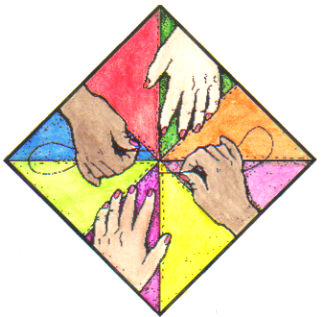|
Looking for Love?

People all over the world are looking for love. According to Amazon.com, there are at least 32,507 books currently in print
with the word love in the title (over 145,000 that deal with the subject of love). There are more than 11,000 popular albums/CDs
with love in the title. A Google search of the Internet reveals that there are at least 121,000,000 Websites that use the
word love as one of their key words. 1
The Bible is a book about a love story. It is about God’s love for humanity, His wooing of our affection through the
mediator, His Son. The word love (various forms) is found 419 times in the Bible. The book of 1 John has love for its theme.
It tells us that “God is love” (1 John 4:8), and then shows that God has demonstrated—made manifest—His
love (3:16; 4:9–10). Love is not just something we feel; it is more often something we do.
Love requires action; it is demonstrated through behavior. God’s love is more than just talk; He demonstrated compassion
so we would learn to be compassionate. As Paul said, “Faithful is he that calleth you, who also will do it” (1
Thessalonians 5:24). John wrote, “My little children, let us not love in word, neither in tongue; but in deed and in
truth” (1 John 3:18; cf. James 2:15–16).
God demonstrates His love for us by gift-giving.
One of the “five languages of love” 2 is “gift-giving.” We enjoy surprising our mates with
a little something we picked up on a trip. We take pleasure in giving presents to our children during the holidays. We celebrate
graduations, weddings, and births with gift-giving.
God also uses this “love language” to express His sentiments to man. He “gave gifts unto men” (Ephesians
4:8). He leaves no one out—even His avowed enemies get daily gifts from the Creator they deny. “The Lord is good
to all: and his tender mercies are over all his works” (Psalm 145:9). He gives us sunshine and rain, fruitful seasons,
and beautiful vistas. Paul and Barnabas explained that God had “left not himself without witness, in that he did good,
and gave us rain from heaven, and fruitful seasons, filling our hearts with food and gladness” (Acts 14:17; cf. Matthew
5:45).
God demonstrates His love for us through the life of His Son.
Jesus helped us to get to know the God of love. Love (various forms) is found eighty-six times in the eighty-nine chapters
of Jesus’ biographies (when compassion is added, the total increases to one hundred times). Jesus told Philip, “He
that hath seen me hath seen the Father” (John 14:9). We saw Jesus’ love demonstrated in feeding hungry people
(John 6), healing hurting people (Matthew 4:24), directing lost people (Matthew 9:35–36), correcting wrong people (Matthew
23), accepting rejected people (Luke 19:1–10), and dying for lost people (Matthew 20:28).
Someone once wrote about a traveler who fell into a deep pit and couldn’t get out. Several persons came along and saw
him struggling in the pit.
- The sensitive person said, “I feel for you down there.”
- The reflective person said, “It’s logical that someone would fall into the pit.”
- The aesthetic person said, “I can give you ideas on how to decorate your pit.”
- The judgmental person said, “Only bad people fall into pits.”
- The curious person said, “Tell me how you fell into the pit.”
- The perfectionist said, “I believe you deserve your pit.”
- The evaluator asked, “Are you paying taxes on this pit?”
- The self-pitying person said, “You should have seen my pit.”
- The counselor said, “Just relax. Don’t think about the pit.”
- The optimist said, “Cheer up! Things could be worse.”
- The pessimist said, “Be prepared! Things will get worse.”
- Jesus, seeing him, loved him, and lifted him out of the pit.3
A Christian can truthfully sing, “I was sinking deep in sin, far from the peaceful shore” when “love lifted
me!”
God demonstrates His love for us through the death of His Son.
God has an infallible track record. He can be trusted. He has proven beyond question that He loves us. The Bible says, “But
God commendeth 4 [demonstrated] his love toward us, in that, while we were yet sinners, Christ died for us”
(Romans 5:8).
John Griffith lived in Oklahoma in 1929, and he lost all he had in the stock market crash. He moved to Mississippi, where
he took a job tending a bridge for a railroad trestle. One day in 1937, his eight-year-old son, Greg, spent the day with his
dad at work. He played in the office that morning and asked a thousand questions. Then a ship came through and John opened
the drawbridge. Suddenly, he realized his son wasn’t in the office.
Frantically he looked around, and to his horror saw him climbing on the gears of the draw bridge. He hurried outside to rescue
his son, but just then he heard what he knew was a fast-approaching passenger train, the Memphis Express, filled with four
hundred people. He yelled to his son, but the noise of the now clearing ship and the oncoming train made it impossible for
the boy to hear him. John Griffith realized his horrible dilemma. If he took the time to rescue his son the train would crash
and kill all aboard. If he closed the bridge, he would sacrifice his son.
He made the decision he would relive ten thousand times and pulled the lever to close the bridge. As the train went by he
could see some passengers’ faces. Some were reading, some waved, and all were oblivious to the sacrifice that had just
been made on their behalf.
God once faced a similar dilemma. He could not save sinners and spare Jesus, too. How could He be “just” and “justifier”
at the same time? (cf. Romans 3:26). God had to allow the jaws of death to close in on His Son. He “spared not his own
Son, but delivered him up for us all” (Romans 8:32). Millions go by oblivious and indifferent, even some who know the
sacrifice.
Still, there is one tremendous difference between the two fathers. Unlike the Memphis Express that caught John Griffith by
surprise, sending Jesus was not a panic move. It wasn’t a spontaneous decision. It was planned. Paul said, “But
when the fulness of the time was come, God sent forth his Son, made of a woman, made under the law” (Galatians 4:4).
Jesus’ death was not the result of jealous Jews or hard-hearted Romans. It was the result of a loving God who saw there
was no other way to save man. “Hereby perceive we the love of God, because he laid down his life for us” (1 John
3:16). 5
Since people are looking for love, and “God is love” (1 John 4:8), God is what people are looking for!
Allen Webster
Heart to Heart, House to House
Endnotes:
1 “God Is Love,” Scott R. Bayles, SermonCentral.com.
2 According to Gary Chapman’s best-selling book The Five Language of Love.
3 Author unknown.
4 sunistao, sunistano, sunistemi, “to set together, by implication to introduce (favorably), or (figuratively)
to exhibit; intransitively to stand near.”
5 For more, see The Scourging of Jesus.
Paul's Bundle Of Sticks
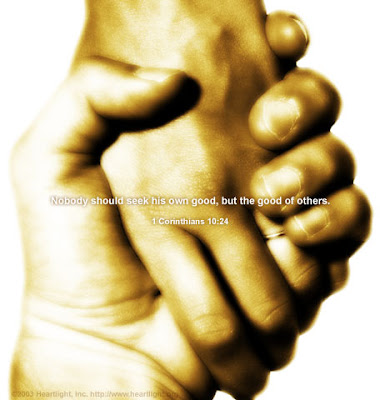
In Acts 28, after Paul and his shipmates survived a shipwreck and landed on Malta, the stranded passengers found themselves
cold and wet in a strange place. The natives, however, were friendly and built a fire for them all (Acts 28:2). It is interesting
that Paul "gathered a bundle of sticks and laid them on the fire" (3). This was when Paul was bitten by an apparently deadly
viper. Somehow, in reading this part of Paul's journey to Rome, I overlooked a fundamental fact that helped make Paul great.
Paul did his part. When the others had built that fire, Paul was not content to let the others do it all. He did his share.
Not only that, he did his share even at great, personal cost. He did his share, though he might have rationalized that he
had already done so much and been through so much. Paul noted their unusual kindness and was made to feel very welcome.
He showed his appreciation in a tangible way.
You may be a busy, active servant of God. You may have done much in the past for the cause of Christ. Yet, think about how
notable it is and inspiring to others, when you gather your own bundle of sticks to help the fire others have started. It
may be noted and remembered long after you are gone.
by Neal Pollard
via Daily Bread newsletter
Design
Origins Part 1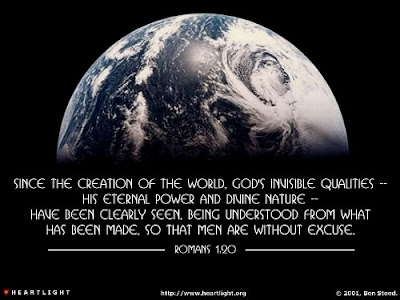
I have been dabbling in knitting design (for evidence see here, here or here)and I have come to the conclusion that designing is actually hard work. It takes a significant amount of creativity and thought
to convert an idea into a concrete item and then to put that information into a format that someone else can understand and
appreciate. It is not something that happens by accident or without a bit of effort. Yet, there are those who say just the
opposite about the world in which we live. There are those who think that the beauties and wonders of this universe are just
happy accidents that occurred over billions and billions of years. But is that really true?
If you will kindly indulge me, I would like to share with you my journey to a deeper understanding of the origins of the universe.
This has been a long and often difficult process for me. One that frequently required to rethink what I had been taught. Since
this was a rather lengthy process, I will not attempt to write it all in one post.
First, let me give tell you a little bit about my background. I was reared in a semi-religious home. My family was sporadic
in church attendance so while I had been given a reasonable exposure to the Bible, it was not something that was deeply ingrained
in me. When I went to college, I, for the most part, gave up religion. I found "churches" to be full of hypocrites and I came
to doubt most of what I was taught as a child.
Throughout elementary and high school my favorite subject was always science so when I went to college, science was the natural
course of study for me. Though my emphasis changed several times while I was in college (shifting from a medical to a research
orientation), my major field of study was always science (biology/math major; chemistry minor). There was a precision and
order to the sciences that I found very appealing. There was a beauty to the way one branch of science interacted with another
that I found fascinating.
The course of study in any science field is pretty strenuous. There aren't a lot of “goof-off “ classes and most
of the allowed electives are science electives. So most semesters, I took at least one biology, one chemistry and one math
and usually one other science (physics, geology, etc). Biology, being the science of life, gave me more opportunity to study
the how life began, how species are interrelated and how it all fits together.
The rigorousness of a biology program doesn't provide one much time to digest what is learned. Mostly, you were stuffing the
information into your head as quickly as possible in order to spit it back out on the tests. There simply wasn't time to
question things, because you were too busy learning a of myriad facts - phyla, genera, species, bones, muscles, tissues, organs,
etc. Your head was so full of facts that there was little room for logical reasoning. It was in this environment that I learned
the theory of evolution and the general theories on the origin of the universe.
I will begin by explaining in simple terms the origin of the universe from the biological standpoint. According to what I
was taught, the universe began when a ball of matter inexplicably exploded causing a great release of energy and sending bits
of itself spiraling outward throughout the universe. Some bits of this matter formed stars, others formed planets, still others
formed asteroids or other various space rocks. As the spiraling continued, some of the bits of miscellaneous space debris
began developing orbits around the various stars, giving rise to solar systems. Through a series of random occurrences, the
earth developed an orbit around its star (our sun) at a location that was neither too close nor too far from its source of
heat and light. That unique location allowed the formation of certain organic (carbon-based) compounds in a sort of primordial
soup. That group of chemicals was then radically changed by some major dynamic event (a lightning strike, for instance) to
become the first living organism. Over a period of hundreds of billions of years, this organism evolved from a single cell
creature to a multi-celled organism and eventually, through a combination of random mutation and natural selection, into the
thousands of species that we see today. That is the short version.
There is some biological evidence that would seem to support this theory. For example, the similarity of features between
one species and another would seem to suggest that they were once related. The bone structure of the frog, for example, is
remarkable like that of the human. A pig fetus develops in a manner similar to a human. Is this proof that these radically
different species developed from common ancestors? Or is there another possible solution?
In my study of knitting design, I have come to realize that I can recognize certain style elements of a particular designer.
I can look at a pattern and often know who the designer is based on the overall style or certain unique design elements of
the item. Likewise, there is also a similarity between the different projects of architects, painters, sculptors, etc. Is
it not possible then, that the reason there are so many similarities between one species of animal and another is simply that
they had the same designer? Is it possible that rather than the elaborate theories of evolution, that it is possible that
the earth could actually have been created exactly the way the Bible claims?
We will explore these ideas in the coming posts. I am hoping that you will enter these studies with an open mind. I admit
to a certain amount of bias when I began searching for these answers. As I college student, I tended to accept the word of
my professors without question. I hope that you will enter into this study with the desire to follow where the evidence leads.
Playing God
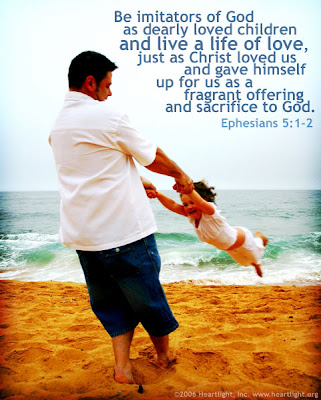
We sometimes refer to someone's actions as "playing God." By that, we usually mean that they are standing in judgment
over another person in a way that only God can, or that they are making a decision regarding who will live or who will die.
Most of the time, we use that term in a negative way. I heard a story recently, though, told by Mee Spousler that sheds
a whole new light on the term "playing God."
Mee tells how she was trying to put her three-year-old son to bed for a nap. When she was unsuccessful, she put him in
her bed and laid down with him to encourage him to rest. She fell asleep, but he didn't. When she woke up, she saw him sitting
on a chair at the end of the bed, and asked, "Luke, what are you doing?"
"I'm playing God," he replied.
"Playing God?" she asked.
"Yes," he said. "I'm watching over you while you sleep."
What a beautiful thought, because that is what God does. David wrote: "I cried to the Lord with my voice, and He heard
me from His holy hill. I lay down and slept; I awoke, for the Lord sustained me." (Psalm 3:4-5)
Wouldn't it be great if we could all, like that 3-year-old boy, learn to "play God" in ways that would impact this world
for good?
- We need to "play God" by looking at the hearts of people rather than the clothes they are wearing.
- We need to "play God" by forgiving those who have offended us.
- We need to "play God" by refusing to allow race or the color of a person's skin to create barriers.
- We need to "play God" by being patient, kind, and loving to the the people we deal with throughout the day.
- We need to "play God" by showing compassion to those who are suffering or in need.
- We need to "play God" by keeping our promises and living lives of honesty and integrity.
- We need to "play God" by living in such a way that we reflect the nature of our Heavenly Father.
I hope and pray that people around you will see you "playing God" this day.
Have a great day!
Alan Smith
Via Thought for the Day email
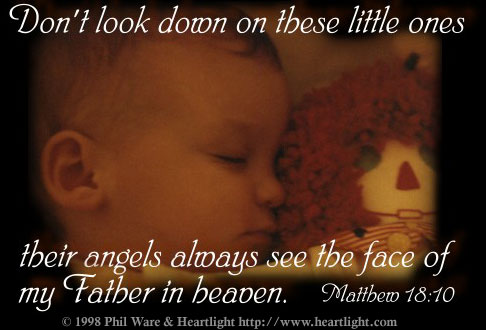 People Not to Overlook
There are some people hard to overlook. There's the lady wearing the big hat with a potted plant on it. There's the older
man with the bushy white hair and plaid sports coat. There's the six year old that stands six-foot-three. There are also
those people that it may be easy to overlook. We don't mean to or want to, but seem to. Sometimes, we overlook them because
they keep to themselves and don't really want to be seen. Others, however, are so unassuming that they are easy to miss.
There are instances, unfortunately, where we are too caught up in ourselves or our circle of friends so that we fail for
lack of trying.
Consider the following "types" or categories of people that we cannot afford to overlook:
- THE POOR. We have them with us always (Mark 14:7). The Lord wants us to care about them and care for them (1 Jn. 3:14ff).
They likely lack influence or the ability to do anything for you, but they need your attention.
- THE NEW CHRISTIAN. They are highly impressionable and vulnerable. They start their Christian walk standing at the
fringe and need us to "pull them in" the fellowship. Their faith is fledgling. Their new life may have them feeling lonely
and strange. Let's not leave these babes at the baptistery steps to fend for themselves.
- THE ELDERLY. Their peer group is shrinking. They often are widowed. They grew up in a completely different age,
but they have those basic human needs--including companionship. They still possess a great capacity to love, feel, and share.
Don't pass by the hoary head.
- SMALL CHILDREN. You may have to stoop down or slow down to notice them, but they are there. You may extend your
hand to shake theirs and see them disappear into mom's skirt or run the other way. No matter. Your notice of them will not
be unnoticed to them. They will remember you for remembering them.
- TEENAGERS. Outwardly, they look aloof, unconcerned, occupied, or, at times, uninterested in your attention. Yet,
many times, they are looking for identity, struggling with self-confidence, and coping with major life changes. They need
notice.
- THE NEWCOMER. They have uprooted and chanced to leave the familiar for the unfamiliar. Imagine yourself in their
shoes, now in a new setting and faced with fitting into a new family. That's not easy! Practice the golden rule. Let them
in.
- THE STRANGER. They are the visitor, often straight off the street. They are processing their first impression.
You may pause and look at them, not know what to do or say, and keep moving. Please don't do that! Greet them. Welcome
them. Find out about them. Tell them about yourself. Make sure they leave you no longer a stranger. Overlook them and
they may not return...ever. If they are a non-Christian or wayward Christian, they may find in you a lifeline that changes
their eternity.
- THE STEADY. The quiet worker, the "always there," and the disciple behind the scenes may enjoy escaping the "lime
light," but they yearn for and desire the human connection, too. Let us never take them for granted. Without them, we would
greatly suffer.
We all do it, but let's not take comfort in it. Notice even those that we may mistake for the "little people." Remember,
that God sees no "little people." He sees souls. So must we!
Neal Pollard
Daily Bread Newsletter
Back to TOP
|
|

Just for today...
- I will not strike back. If someone is rude, if someone is impatient, if someone is unkind, I will not respond
in that way (Romans 12:19).
- I will ask God to bless my enemy. If I come across someone who treats me harshly or unfairly, I will quietly
ask God to bless that individual (Matthew 5:44). I understand my enemy could be a family member, a neighbor, a co-worker,
or a stranger.
- I will be careful about what I say. I will carefully choose and guard my words, being certain that I do not
spread gossip (James 3:1–6).
- I will go the second mile. I will find ways to help share the burden of another person (Matthew 5:41).
- I will forgive. I will forgive those who hurt me (Luke 23:34).
- I will secretly do something kind for someone. I will reach out anonymously and bless the life of another
(Ephesians 4:32).
- I will treat others the way I wish to be treated.
I will practice “the Golden Rule” (Matthew 7:12).
I will do unto others as I would have them do to me, with everyone I encounter.
- I will raise the spirits of someone who is discouraged.
My smile, my words, my expressions of concern and
support can make a difference to someone facing a challenge (Romans 14:19).
- I will take care of my body.
I will eat less . . . I will eat healthier . . . I will exercise . . . I will
be thankful . . . My body will be a fitting temple for Him who dwells in me (1 Corinthians 6:19–20).
- I will grow spiritually. I will spend more time in study, prayer, and meditation. I will retreat from life’s
pressures and distractions and seek to learn God’s will (2 Peter 3:18).
"So if there is any encouragement in Christ, any comfort from love, any participation in the Spirit, any affection and sympathy,
complete my joy by being of the same mind, having the same love, being in full accord and of one mind.
Do nothing
from rivalry or conceit, but in humility count others more significant than yourselves. Let each of you look not only to his
own interests, but also to the interests of others.
Have this mind among yourselves, which is yours in Christ Jesus,who,
though he was in the form of God, did not count equality with God a thing to be grasped, but made himself nothing, taking
the form of a servant, being born in the likeness of men. And being found in human form, he humbled himself by becoming obedient
to the point of death, even death on a cross.
Therefore God has highly exalted him and bestowed on him the name that
is above every name, so that at the name of Jesus every knee should bow, in heaven and on earth and under the earth, and every
tongue confess that Jesus Christ is Lord, to the glory of God the Father.
Philippians 2:1-11(ESV)
Back to TOP

|
